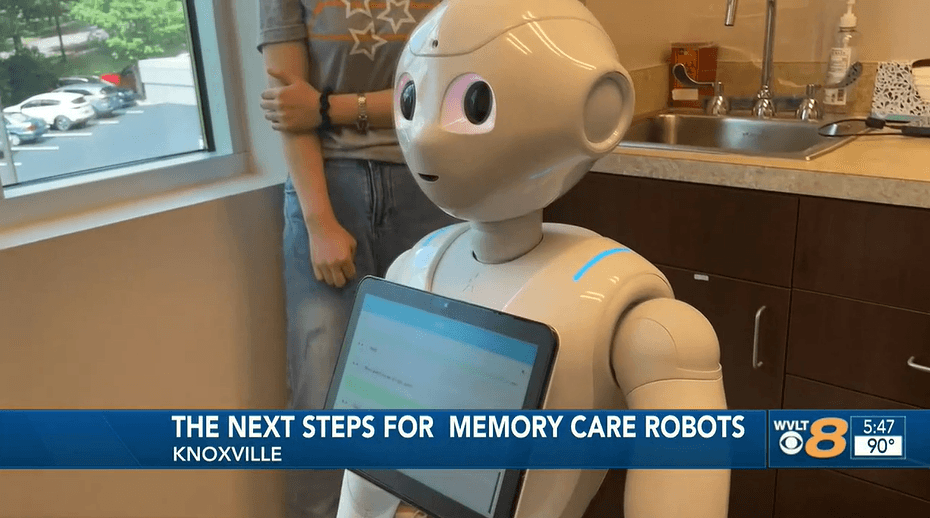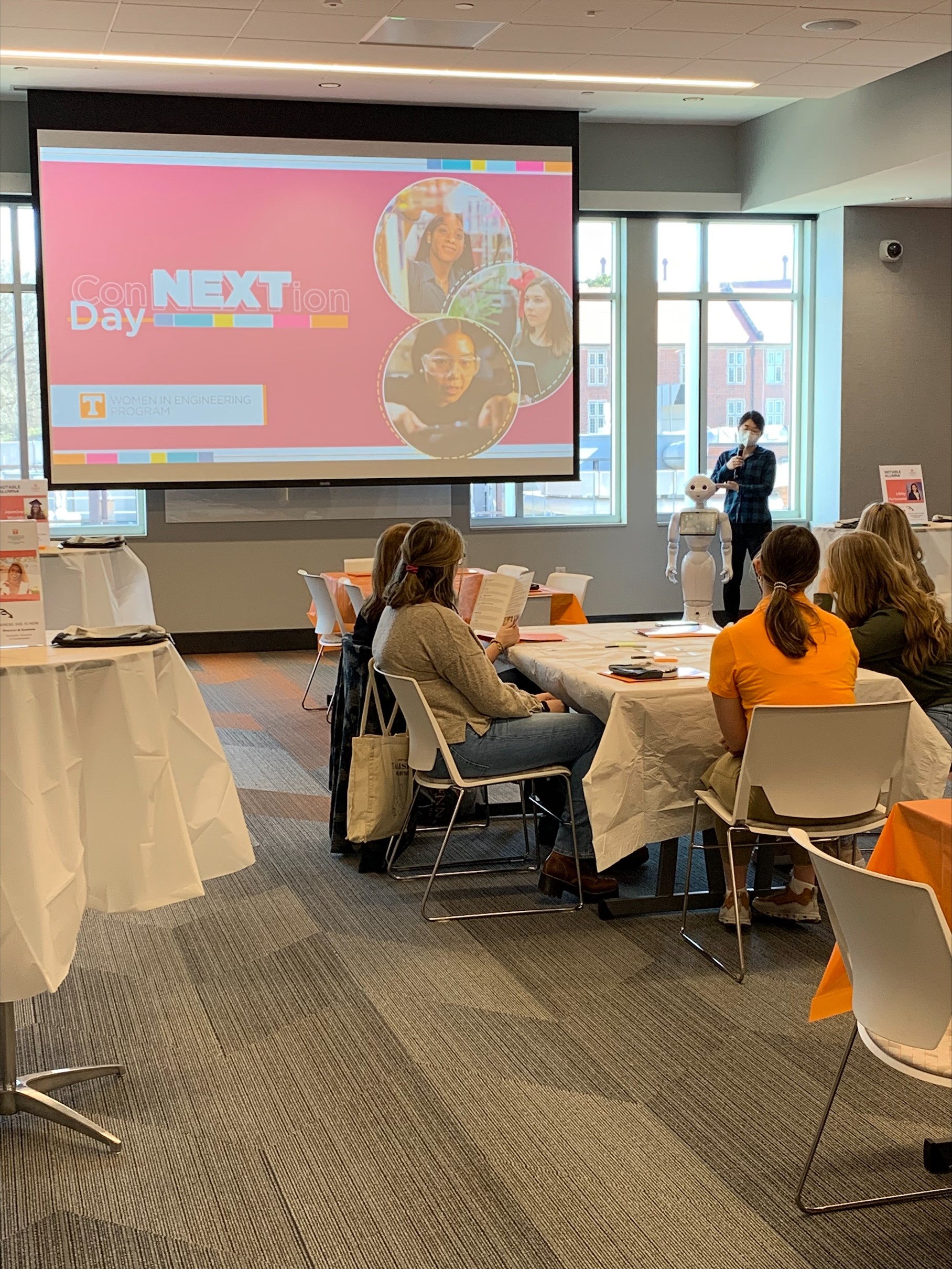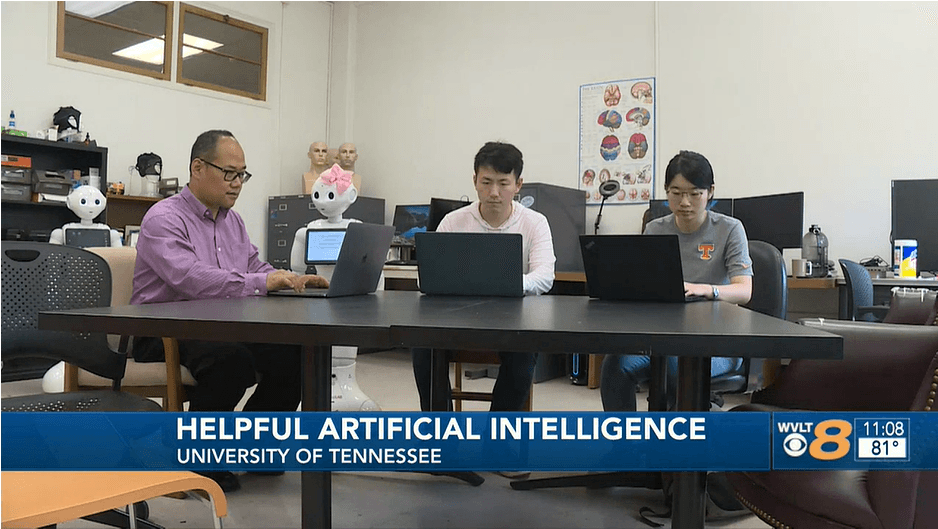Xiaopeng Zhao is a professor at the University of Tennessee, Knoxville working in the Department of Mechanical, Aerospace, and Biomedical Engineering. Zhao and his students conduct research and develop projects focused on how Pepper Robot, along with AI and other information and communication technologies, can assist diagnosis, care, and rehab of people with dementia.
This is his amazing story!

For Zhao, Pepper robot’s capabilities of multimodal interaction such as conversation, body movement, eye contact, and GUI were the main reason he wanted to incorporate it into research. Pepper became part of his lab at the end of 2018. Later, two more Pepper robots were purchased.
Zhao and his collaborators want to know how robots, AI, and technology could help people with dementia. This is the answer:
Different Projects.
- Pepper robot is a friendly companion with interactive singing, dancing, conversation, and question-answering.
- Pepper Robot assists with cognitive exercises (e.g., showing a picture and asking questions to spark a conversation, brain games) and physical exercises for people with dementia
- CARE: Comprehend, Assists, Relieve, and Evaluate: What is the relationship between a person with dementia and the robot? In this NIH-funded project, Zhao and his colleagues (Dr. Hairong Qi, Dr. Joel Anderson, and Dr. Ruth Lopez) aim to find out how Pepper robot can give proper assistance, instructions, and reminders to assist persons with dementia in their activities of daily living.

In some of the projects, the Pepper robot plays the role of a companion by playing games with patients and assisting with in-clinic evaluations of people with dementia.
Participation of the students in the projects.
“My students have accepted modern technology immediately”, says Zhao, “they learn from the barriers to adapt and change the limitations that technology can bring to their projects”.
The students are motivated to work hard on these projects. With advanced learning, they develop techniques to figure out AI capabilities with the robots. They work with the operating system, integrate the data, share it, learn the sensors of the robots, etc. The projects are really challenging, says Zhao, but they are the intermediaries on expanding the capabilities of Pepper and the next generation of robots that benefit seniors with cognitive and physical disabilities as well as young adults.
"Our goal is to find out the needs, the potential, and the challenges of each of our projects - what are the limitations and how can technology help? That's why we use AI with Pepper robot. We want to try the best solutions" -Zhao.
What is the impact of the community with Pepper Robot?
Zhao has worked with Dr. Monica Crane at the Genesis Neuroscience Clinic and Dr. Sharon Bowland at the College of Social Work to bring the Pepper robot to test it with people with dementia and their caregivers. The response was overwhelmingly positive, although, for a few people, the robot may be a little scary. For others, it was a great collaborative, assistive tool for dementia care.
“One specific case that brought the attention to how robots are helping people with dementia is when a patient was asked by a clinician to conduct a cognitive assessment task. The patient was very stressed, worrying about being evaluated by the clinician. However, when she was asked to perform a similar task administered by the robot, she completed the task with great ease, thinking the robot as a fun tool."- said Professor Zhao.
The plan is to continue working on new ways to use Pepper, including having the robot incorporate new solutions in the medical field. For Zhao, robots are the new “cobots” and it is important to have a clear connection with them.
Expanding the horizons for Pepper in educational fields and in more medical fields is something that Professor Zhao is looking forward to doing.
Here are some journalistic articles of Professor Zhao talking about his projects as well:
https://www.wvlt.tv/2021/07/07/ut-creating-artificial-intelligence-help-slow-dementia-progression/
 Ms. Fengpei Yuan, a Ph.D. student at Zhao’s Lab, presented her research using Pepper at Women in Engineering ConNEXTion Day at the University of Tennessee, Knoxville.
Ms. Fengpei Yuan, a Ph.D. student at Zhao’s Lab, presented her research using Pepper at Women in Engineering ConNEXTion Day at the University of Tennessee, Knoxville.
Interested in Pepper Robot?
Pepper is available today for businesses and over 2,000 companies around the world have adopted Pepper as an assistant to welcome, inform and guide visitors in an innovative way. Standing 4ft/120cm tall, Pepper has no trouble perceiving her environment and entering into a conversation when she sees a person.




